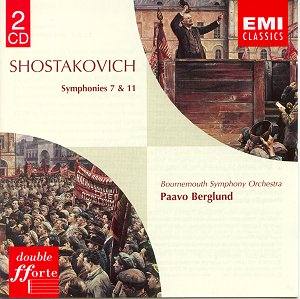DMITRI SHOSTAKOVICH (1906-1975)
Symphony No. 7 Leningrad (1941) 73.29
Symphony No. 11 The Year 1905 (1957) 66.37
 Bournemouth SO/Paavo
Berglund
Bournemouth SO/Paavo
Berglund
 rec Guildhall, Southampton
No. 7: Jan 1974; No. 11 Dec 1978 EMI Classics Double Forte 5 73839 2
2CDs - 73. ADD [29+66.37]
rec Guildhall, Southampton
No. 7: Jan 1974; No. 11 Dec 1978 EMI Classics Double Forte 5 73839 2
2CDs - 73. ADD [29+66.37]
Crotchet
Amazon UK Amazon USA

These two recordings leave one lamenting that Berglund did not tackle a complete
Shostakovich cycle. As it is I know Berglund's versions of the two symphonies
and of the Sixth which is also highly regarded.
The analogue recordings
have been in and out of the catalogue (and
mostly in) since their issue on LP in 1974
and 1980 respectively … and no wonder.
Berglund's Nordic credentials stood him
in excellent stead for these readings. Those
credentials were further bolstered by his
years with the Bournemouth Orchestra which
rose to a sustained zenith during the his
time with them. The parting of the ways
between Berglund and the Bournemouth orchestra
is as much to be lamented as Rozhdestvensky's
severing from the BBC Symphony Orchestra.
Berglund did great work with the BSO during the decade from the early 1970s
and I affectionately recall that it was this orchestra and conductor who
at the University Great Hall, Exeter in 1970 gave me my first concert hall
experience of Sibelius's Symphony No. 5. In the recording field Berglund's
Sibelius symphony cycle, especially Kullervo and Luonnotar (the
latter with Taru Valjakka), remains deeply impressive and preferable to his
COE and Helsinki PO cycles. His Vaughan Williams 4 and 6 are craggy and his
red-blooded Walton Violin Concerto with Ida Haendel is still my first choice
amongst modern(ish) recordings. What a pity Berglund never recorded Walton
Symphony No. 1 or Bax Symphony No. 6; his orchestra knew both works under
Maurice Handford and Vernon Handley respectively.
His Shostakovich 7 is not at all the work of a cheap pedlar of street-corner
emotions. On the contrary while Berglund does not convert the primary colour
extremes of parts of the first movement into a domesticated water-colour
he lends the work a colossal remorseless stride. So effective is this gigantic
tread that the excitement generated by the blatant heroics of the first movement
are quite irresistible. There is some outstandingly poetic and over-the-top
work from clarinets and trumpets in the first movement. The French horns
are simply magnificent at the climax of the first movement. When one comes
to the Adagio (a 'Soviet Requiem' carried over from the arching intensity
of the Sixth Symphony) the inward emotions are patently sincere in Berglund's
hands. The col legno staccato at 5.10 in the finale demonstrates the
realistic analytical quality of the recording. The brass rear up like dark
crags at 14.34 in the finale carrying a message of grim and resounding optimism.
The Eleventh is also given a no holds barred performance seeming to me more
filmic than ever. Notable is the first movement like a brooding and gloomy
Tallis Fantasia. The second movement is remarkable for Berglund's exploration
of a sense of threat threaded with optimism and long-suffering bitterness.
While this performance and recording does not overwhelm in the way De Preist's
Helsinki PO Delos reading does it is a fine performance of a work too easily
written off. As for the movement titles I find them a distraction. The music
itself is well worth your attention. If in this work Shostakovich occasionally
falls victim to writing more rather than less he can easily be forgiven in
the face of such vivid emotionalism.
No. 7 was first issued on LP EMI SLS897 (2LP box) and then reissued on CDC
7 47651-2 (73 minutes). No. 11 SLS5177 also reissued on CD on CDS7 47790-8.
It only remains to add that Peter Avis's notes are helpful and concise.
A set which at mid-price
is an easy recommendation. The analogue
master tapes are now more than twenty years
old and some may prefer the last word in
digital sound. So far as comparative versions
are concerned I have a great deal of time
in both symphonies for Rozhdestvensky, Mravinsky
and Kondrashin (the latter two requiring
considerable tolerance). Haitink is also
reckoned a front-runner and will be worth
sampling. De Preist's No. 11 on Delos is
definitely worth seeking out. However for
me the warmth of this recording and Berglund's
articulation of the spirit of tundra turmoil
make this a dream-team set.
Reviewer
Rob Barnett

